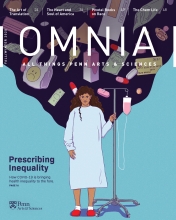In a Changing World
A Message from Dean Steven J. Fluharty, Dean and Thomas S. Gates, Jr. Professor of Psychology, Pharmacology, and Neuroscience.
This year has been a powerful reminder of an enduring truth: some of the most important events and circumstances in life are beyond our control.
At the start of 2020, no one on campus imagined the disruption that was soon to come. When campus life went virtual in March, the School of Arts & Sciences had to quickly pivot to sustain our mission—beginning with our commitment to our students. Faculty built on previous innovations and experiments in teaching, such as SAIL classes, where students view lectures online and in-class time is focused on discussion and problem-solving. Motivated by such experiences, an open mind—and of course, by necessity—we have been able to rise to the moment. We all look forward to a future when our students and faculty are once again able to meet in classrooms, but by working collectively our community has created new ways to teach, learn, and explore in these drastically different times.
The events of the past year have deepened my appreciation of another enduring truth: to navigate a changing world, where we can’t predict what lies ahead, there is no better preparation than a liberal arts education. The focus on skills that can be applied to any situation—skills in thinking, analyzing, and communicating—remain relevant no matter how much the world around us transforms. It’s an education that enables our graduates to follow not just their chosen path, but paths that they could not have imagined when they came to Penn, decided on their major, or landed their first job.
In my many years at Penn I have seen countless demonstrations of the power of the diverse combinations of skills, knowledge, and understanding that characterize Arts & Sciences undergraduates and alumni. Saachi Datta, C’21, whose path to medicine includes majors in biology and religious studies, has already co-authored a peer-reviewed paper examining how religious beliefs impact patients with neurodegenerative disease. And Glenn Singleton, C’86, has moved from his roots as a communications major to launching Courageous Conversations, a framework for interracial dialogue that he now uses with school districts, state governments, and corporations throughout the U.S. and around the world, to help address one of the defining issues of our time.
In times like this I’m also reminded that the impact of a liberal arts education extends beyond equipping individuals for productive lives. Engagement in music, art, and literature provides inspiration and insight, enriches our lives, and helps us make sense of our most difficult moments. And then there are the impacts on our communities—local, national, and global. Citizens who are knowledgeable about the world and its complexities; who are attuned to moral, ethical, and social issues; and who are prepared to exercise intellectual leadership—all qualities that are cultivated through study in the liberal arts—offer what I think most of us can agree are essential ingredients for a healthy society. The understanding that comes from the liberal arts provides a context to address issues ranging from political polarization and the historical roots of racial injustice to working together as a society to cure disease and end pandemics. This is the path that I believe will make us truly able to respond to the challenges of a changing world.



